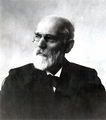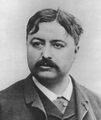Template:Selected anniversaries/November 23: Difference between revisions
No edit summary |
No edit summary |
||
| (5 intermediate revisions by the same user not shown) | |||
| Line 4: | Line 4: | ||
||534 BC: Thespis of Icaria becomes the first recorded actor to portray a character onstage. | ||534 BC: Thespis of Icaria becomes the first recorded actor to portray a character onstage. | ||
||1553: Prospero Alpini born | File:Prospero_Alpini.png|link=Prospero Albini (nonfiction)|1553: Physician and botanist [[Prospero Albini (nonfiction)|Prospero Alpini]] born. He will travel around Egypt, serve as the fourth prefect in charge of the botanical garden of Padua, and write several botanical treatises covering exotic plants of economic and medicinal value. | ||
File:Jean-André Lepaute.jpg|link=Jean-André Lepaute (nonfiction)|1720: Clockmaker [[Jean-André Lepaute (nonfiction)|Jean-André Lepaute]] born. He will be an innovator, making numerous improvements to clockmaking, especially his pin-wheel escapement, and his clockworks in which the gears are all in the horizontal plane. | File:Jean-André Lepaute.jpg|link=Jean-André Lepaute (nonfiction)|1720: Clockmaker [[Jean-André Lepaute (nonfiction)|Jean-André Lepaute]] born. He will be an innovator, making numerous improvements to clockmaking, especially his pin-wheel escapement, and his clockworks in which the gears are all in the horizontal plane. | ||
| Line 10: | Line 10: | ||
||1820: Isaac Todhunter born ... mathematician and author ... best known today for the books he wrote on mathematics and its history. Pic. | ||1820: Isaac Todhunter born ... mathematician and author ... best known today for the books he wrote on mathematics and its history. Pic. | ||
||1826: Johann Elert Bode dies ... astronomer known for his reformulation and | ||1826: Johann Elert Bode dies ... astronomer known for his reformulation and popularization of the Titius–Bode law. Bode determined the orbit of Uranus and suggested the planet's name. Pic. | ||
File:Johannes Diderik van der Waals.jpg|link=Johannes Diderik van der Waals (nonfiction)|1837: Theoretical physicist and academic [[Johannes Diderik van der Waals (nonfiction)|Johannes Diderik van der Waals]] born. He will win the 1910 Nobel Prize in physics for his work on the equation of state for gases and liquids. | File:Johannes Diderik van der Waals.jpg|link=Johannes Diderik van der Waals (nonfiction)|1837: Theoretical physicist and academic [[Johannes Diderik van der Waals (nonfiction)|Johannes Diderik van der Waals]] born. He will win the 1910 Nobel Prize in physics for his work on the equation of state for gases and liquids. | ||
||1844: Thomas Henderson dies ... astronomer and mathematician noted for being the first person to measure the distance to Alpha Centauri, the major component of the nearest stellar system to Earth, the first to determine the parallax of a fixed star. Pic. | ||1844: Thomas Henderson dies ... astronomer and mathematician noted for being the first person to measure the distance to Alpha Centauri, the major component of the nearest stellar system to Earth, the first to determine the parallax of a fixed star. Pic. | ||
File:Charles Renard.jpg|link=Charles Renard (nonfiction)|1847: Engineer [[Charles Renard (nonfiction)|Charles Renard]] born. Renard will pioneer the design and construction of airships. He will also propose a set of preferred numbers now known as the Renard series. | |||
||1864: Maritime engineer Maxime Laubeuf born ... He was a pioneer in the design and building of submarines, and was responsible for a number of the innovations that led to modern submarine design. His work had a profound influence on the design of submersibles in the late nineteenth century and early twentieth century. Pic. | ||1864: Maritime engineer Maxime Laubeuf born ... He was a pioneer in the design and building of submarines, and was responsible for a number of the innovations that led to modern submarine design. His work had a profound influence on the design of submersibles in the late nineteenth century and early twentieth century. Pic. | ||
| Line 28: | Line 28: | ||
||1874: Theodore Lyman born ... physicist and spectroscopist. He will make important studies in phenomena connected with diffraction gratings, on the wavelengths of vacuum ultraviolet light discovered by Victor Schumann and also on the properties of light of extremely short wavelength, on all of which he contributed valuable papers to the literature of physics in the proceedings of scientific societies. Pic. | ||1874: Theodore Lyman born ... physicist and spectroscopist. He will make important studies in phenomena connected with diffraction gratings, on the wavelengths of vacuum ultraviolet light discovered by Victor Schumann and also on the properties of light of extremely short wavelength, on all of which he contributed valuable papers to the literature of physics in the proceedings of scientific societies. Pic. | ||
||1882: | ||1882: Mathematician Arnold Dresden born ... known for his work in the calculus of variations and collegiate mathematics education. Pic. | ||
||1887: Henry Moseley born ... physicist and chemist. Pic. | ||1887: Henry Moseley born ... physicist and chemist. Pic. | ||
| Line 80: | Line 80: | ||
||2015: Blue Origin's New Shepard space vehicle became the first rocket to successfully fly to space and then return to Earth for a controlled, vertical landing. | ||2015: Blue Origin's New Shepard space vehicle became the first rocket to successfully fly to space and then return to Earth for a controlled, vertical landing. | ||
||2016: Michel Marie Deza dies ... mathematician, specializing in combinatorics, discrete geometry and graph theory. Pic. | |||
|| | ||2020: Chang'e 5 launch: (Chinese: 嫦娥五号; pinyin: Cháng'é wǔhào[note 1]) is a robotic mission of the Chinese Lunar Exploration Program. Like its predecessors, the spacecraft was named after the Chinese moon goddess, Chang'e. It was launched on 23 November 2020 at 20:30 UTC from Wenchang Spacecraft Launch Site on Hainan Island and landed on the Moon on 1 December 2020, followed by returning to Earth with lunar samples on 16 December 2020, at 17:59 UTC. | ||
</gallery> | </gallery> | ||
Latest revision as of 16:23, 7 February 2022
1553: Physician and botanist Prospero Alpini born. He will travel around Egypt, serve as the fourth prefect in charge of the botanical garden of Padua, and write several botanical treatises covering exotic plants of economic and medicinal value.
1720: Clockmaker Jean-André Lepaute born. He will be an innovator, making numerous improvements to clockmaking, especially his pin-wheel escapement, and his clockworks in which the gears are all in the horizontal plane.
1837: Theoretical physicist and academic Johannes Diderik van der Waals born. He will win the 1910 Nobel Prize in physics for his work on the equation of state for gases and liquids.
1847: Engineer Charles Renard born. Renard will pioneer the design and construction of airships. He will also propose a set of preferred numbers now known as the Renard series.
1924: Edwin Hubble's discovery, that the Andromeda "nebula" is actually another island galaxy far outside of our own Milky Way, is first published in The New York Times.




